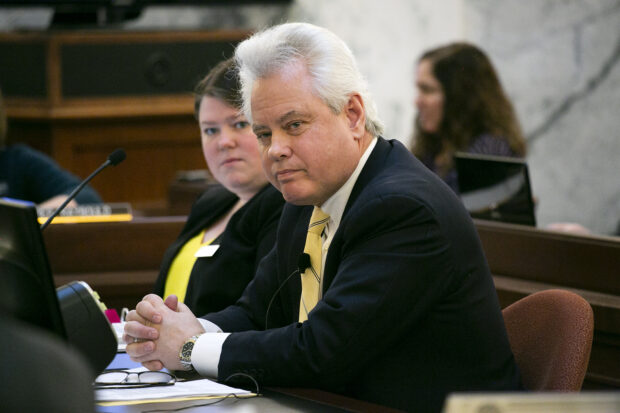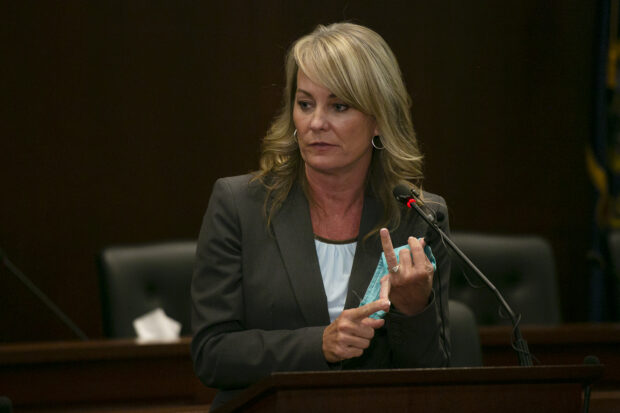Some education leaders are coming in hot, speaking out forcefully about the Statehouse social justice showdown.
Meanwhile, Gov. Brad Little and state superintendent Sherri Ybarra are ducking and dodging.
Unlike these elected officials, University of Idaho President C. Scott Green, Idaho Business for Education and the Idaho School Boards Association recognize the moment. This debate transcends money, although the House has killed more than $1.4 billion in education budgets in the past eight days. It’s really a debate about what happens in the classroom — and the claims, advanced by the Idaho Freedom Foundation and its legislative allies, that Idaho schools are becoming havens of liberal indoctrination.
It’s the most bitter education debate since the 2012 campaign that overturned former state superintendent Tom Luna’s Propositions 1, 2 and 3. And it’s no less important.
“Our free society is under attack, and the education system is the conduit for that attack,” the Freedom Foundation said in a fundraising email this week. “We cannot sit by and watch the demise of our country via the calculated effort to brainwash Idaho’s young people.”
On Friday, two days after the House torpedoed a $315 million general fund budget for higher ed, Green decided he’d heard enough. He exhorted alumni and business leaders to stand up for higher education, and all but called out the Freedom Foundation by name.

“These (special) interests represent a libertarian-based ideology, the principles of which generally do not believe that any public funding should be used for public education,” Green wrote. “They have targeted and tried to redefine issues of diversity, inclusion, and social justice to create an illusion that higher education in Idaho is actively pushing a political agenda wrought with ‘leftist’ indoctrination.”
(As to Green’s comment about opponents’ aversion to public funding for public education, it’s worth noting a 2019 comment from Idaho Freedom Foundation head Wayne Hoffman: “I don’t think government should be in the education business.”)
As Green urged a counterstrike against radio ads and robocalls and “misinformation and half-truths,” IBE was already at work. Eventually, nearly 100 business leaders signed an open letter to the House, saying the vote against the higher ed budget is “putting Idaho’s economic future at risk.”
The IBE is not exactly a cabal of closet leftists. The IBE doesn’t ask its members about their politics, CEO Rod Gramer said, but he believes many of his members are Republicans or Republican-leaning voters. But they willingly signed onto a letter calling out a House of 58 Republicans and 12 Democrats. “These are not unreasonable people. They’re reasonable people who are dealing with an unreasonable climate.”
How unreasonable? In an interview this week, Gramer labeled the current debate as “craziness,” built on claims he has never heard his members raise.
“This is nothing less than a war on education,” he said. “Members of the House have bought into these conspiracy theories, or they’re afraid of these special interest groups. … A lot of people have probably drank this Kool-Aid, and it’s damaging to our state.”
Now to Tuesday, and the House’s 34-34 vote that killed a $1.1 billion teacher salary bill.
It was, speaking objectively, a bizarre 75-minute debate. No lawmaker said the $1.1 billion budget was excessive, and numerous legislators praised the state’s teachers and pledged to support the funding. Citing no cases in specific schools, opponents insisted schools are forcing teachers to discuss critical race theory and social justice issues. They said the budget bill needs legislative “intent language” to curb this practice.
The ISBA, a group representing trustees across the state, lambasted the House for politicizing teacher salaries at a time of unprecedented turnover and burnout.
“As the duly elected officials who are given the responsibility for reviewing and adopting the curriculum and curricular materials that teachers use in their classroom, we vehemently reject claims that our members are ‘indoctrinating’ students,” the ISBA said in a statement late Tuesday.
Quinn Perry, the ISBA’s policy and government affairs director, said she remained shocked Wednesday at the vote, and lawmakers’ message of “distrust (and) vitriol.”
“The K-12 budgets used to be kind of sacred,” she said.
The new K-12 budget still might fully fund pay raises, but Perry is worried about intent language that could leave teachers confused and uneasy about discussing current events, or race in historical context. And all to address an issue that Perry says legislators have never even raised with her.
“Nobody has come to us and said, ‘Here is the curriculum,’ or, Here is what happened,’” Perry said.
So, where are Little and Ybarra?
Idaho Education News requested an interview with Little — to ask about failed budget bills that aligned with his original recommendations, and to ask if he believes the state has a social justice problem in education.
“We cannot accommodate an interview at this time,” said spokeswoman Marissa Morrison Hyer, adding that Little will be willing to talk after the session.
In other words, after the budgets pass, in whatever form they take.
Little isn’t always so timid. As recently as January, he delivered a televised address accusing legislators of playing a “shameful game” of misinformation, jeopardizing millions of dollars of federal coronavirus emergency funding. But with education budgets held hostage by some of these same lawmakers, Little has gone silent.

Ybarra is saying little more.
Ybarra’s staff initially agreed to our interview request, only to bow out Wednesday. Ybarra then released a statement — first to Idaho Education News, then to media statewide — that seemed to try to placate everyone.
“As a former third-grade teacher, I can say with confidence that these educators share our Idaho values because they are our friends and neighbors,” the statement said, in part. “We also recognize that cancel culture and political agendas have no place in our schools. I support the Legislature’s efforts to put in law what is already a standing practice in our schools.”
Translation: Ybarra can live with attaching social justice intent language to the teacher salary bill, whatever it says.
Also silent — at least selectively — is the group making the most noise about the perils of social justice: the Idaho Freedom Foundation.
After Tuesday’s K-12 budget vote, Idaho Education News asked the foundation for some examples of critical race theory or social justice instruction in Idaho school districts — problems that would necessitate budget intent language.
“We respectfully decline to comment,” foundation vice president Dustin Hurst said in an email Tuesday.
 Actually, we asked for specifics, not comment. The foundation has been commenting plenty, without prompting.
Actually, we asked for specifics, not comment. The foundation has been commenting plenty, without prompting.
“Victory,” the foundation said in a tweet after Tuesday’s House vote.
A victory over what, exactly? The foundation isn’t saying.
Each week, Kevin Richert writes an analysis on education policy and education politics. Look for it every Thursday.
